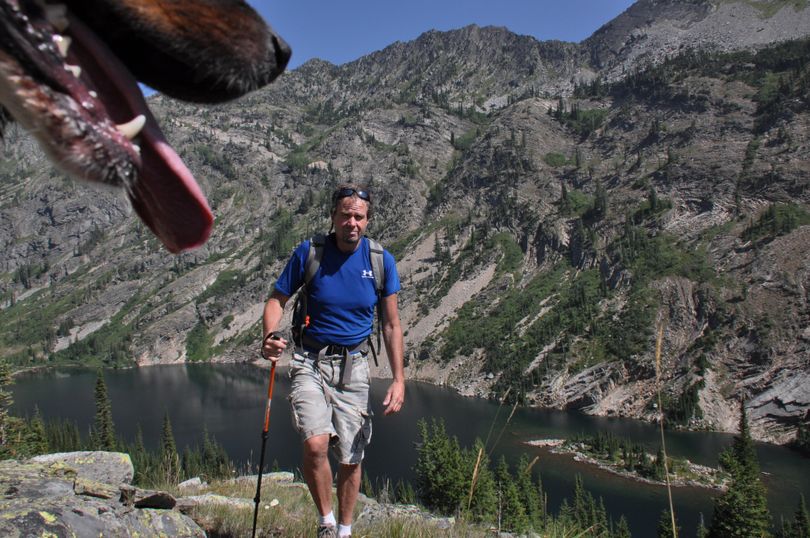Eviros contest Montanore Mine impacts to bull trout, grizzlies

THREATENED SPECIES -- Environmental groups say they filed a lawsuit today regarding the impacts a mine near Libby, Mont., would have on bull trout and grizzly bears in the Cabinet Mountains.
The complaint challenges the U.S. Fish and Wildlife Service’s decision that the proposed Montanore copper and silver mine would not jeopardize the survival or recovery of bull trout and grizzly bears, which are protected under the Endangered Species Act.
The Montanore mine, on the north side of the Cabinets, is one of two proposed mines contested by environmentalists that would significantly increase human activity in the area while drilling from outside the wilderness boundaries to reach ore deposits inside the boundaries. Hecla Mining Co. has recently purchased Revett Mining with intentions to go forward with the Rock Creek Mine on the south side of the Cabinets.
The environmental groups filing the lawsuit today include Save Our Cabinets, Earthworks and Defenders of Wildlife. The action seeks to overturn the Fish and Wildlife Service’s decision in federal district court in Missoula, Montana. The groups are represented by Earthjustice.
Here's more information from the coalition in a media release posted this morning:
The Montanore'sThe Montanore Mine, proposed by Mines Management, Inc. (AMEX: MGN), would transform a remote landscape in the Cabinet Mountains of northwest Montana into a large-scale industrial operation involving the mining and processing of up to 20,000 tons of ore every day for up to 20 years. The site of the proposed mine lies within and adjacent to a federally-protected wilderness that currently contains pristine forests, glaciated peaks, and rivers and streams that are among the purest waters in the continental United States. The proposed mine site and surrounding public lands offer some of the last remaining undeveloped habitat for critical populations of bull trout and grizzly bears that are hanging on by a thread because of habitat destruction, pollution, and human-caused mortality across their range.
Though the Fish and Wildlife Service found that the Montanore Mine would inflict substantial and irreversible damage on bull trout and grizzly bear populations already at risk of extinction, the Service ultimately disregarded its own findings and gave the Montanore Mine proposal a green light.
COMMENTS FROM LEADERS of the groups:
-- Katherine O’Brien, Earthjustice attorney:
“Bull trout and grizzly bears in the Cabinet Mountains are teetering on the brink of extinction, and the Fish and Wildlife Service’s own evidence shows that the Montanore Mine would push them over the edge. The Service had no basis to conclude that turning these species’ habitat into an industrial mine site would allow them to survive and recover.”
-- Mary Costello of Save Our Cabinets:
“Grizzly bears and bull trout are an integral part of Montana’s wild places and mountain streams. The Montanore Mine would spoil the habitat in the Cabinet Mountains for these species and ruin the enjoyment of countless people who treasure Montana’s native fish and wildlife.”
-- Bonnie Gestring of Earthworks:
“If mining companies are allowed to dewater wilderness rivers and streams that provide the last, best refuge for native bull trout, then what chances does the species have for recovery? Montana’s imperiled bull trout deserve a fighting chance.”
-- Jonathan Proctor, Defenders of Wildlife’s Rockies and Plains program director.
“The Cabinet Mountains are one of the few places in the lower-48 states where grizzlies and bull trout remain. The Montanore Mine would destroy vital habitat these species need to survive in the region. Defenders of Wildlife and many others have invested significant funding to reduce grizzly bear-human conflicts in the Cabinet Mountains region. The Montanore Mine would undermine all of that work.”
BACKGROUND from the groups:
Against the backdrop of diminished populations grizzly and bull trout populations in the Cabinet Mountains area, the Fish and Wildlife Service found that the proposed Montanore Mine would cause substantial and irreparable damage to bull trout, grizzly bears, and their habitat. The Service found that the mine would permanently dewater streams on which bull trout depend, increase stream temperatures to levels that are intolerable for bull trout, pollute bull trout habitat with harmful sediment, and promote the intrusion of non-native fish that kill or compete with bull trout. Regarding grizzly bears, the Service found that the Montanore Mine would displace up to seventy-five percent of adult female grizzly bears in the Cabinet Mountains from their preferred habitat, worsen habitat fragmentation, and bring more than 800 new people into the heart of grizzly bear habitat, increasing greatly the likelihood that grizzly bears will be killed due to poaching and conflicts with humans.
But at the end of the day, the Fish and Wildlife Service dismissed these threats to bull trout and grizzly bears and issued a biological opinion contrary to its own findings. The Service asserted that the Montanore Mine’s effects on bull trout are too localized to matter and will not threaten the species’ persistence within the Columbia River Basin. Yet the Service’s most recent assessment reveals that the majority of bull trout populations across the Columbia River Basin are declining, and the Service cited no evidence that populations beyond the reach of the Montanore Mine’s harmful effects will be strong enough to sustain the species.
Regarding grizzly bears, the Service concluded that constructing the Montanore Mine would actually benefit the species because the mining company has promised to fund public education and other measures to reduce conflicts between bears and humans in the Cabinet Mountains region. While conflict-reduction programs have been a key component of grizzly bear recovery efforts, the Service’s conclusion that such measures are capable of neutralizing the risks posed by the mine and associated influx of eight-hundred-plus persons into grizzly country lacks any evidentiary support and conflicts with the Service’s own data.